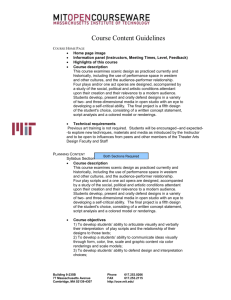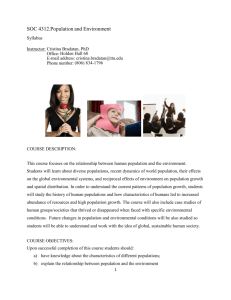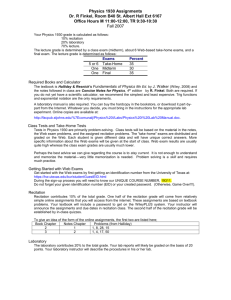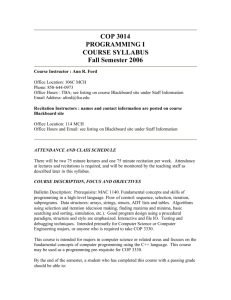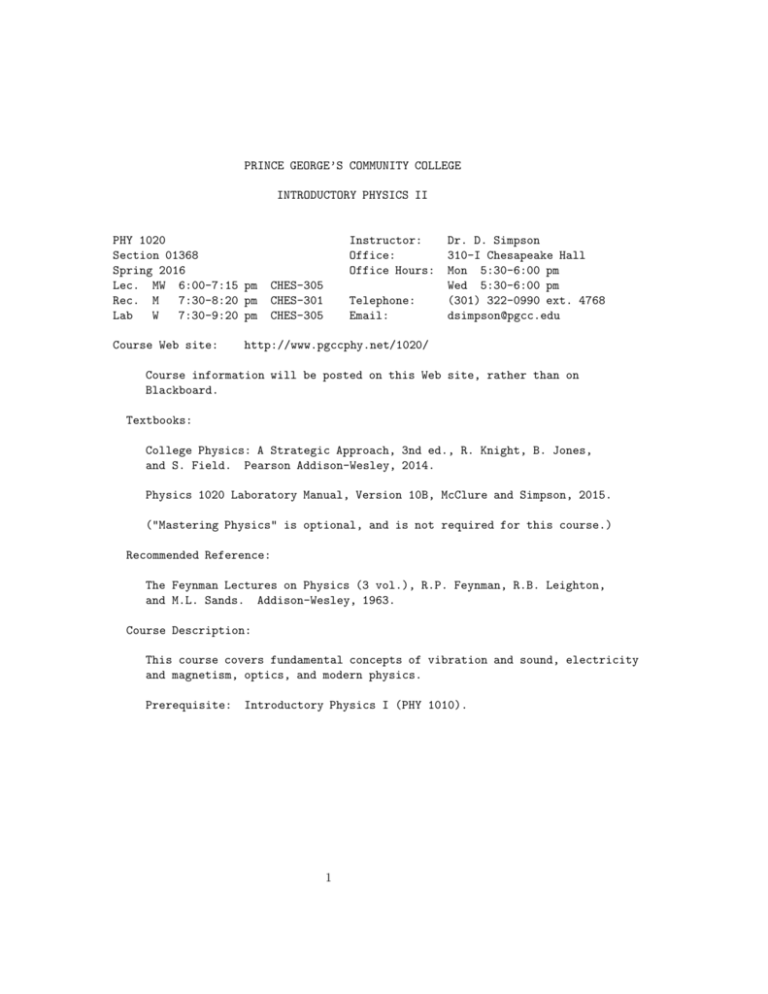
PRINCE GEORGE’S COMMUNITY COLLEGE
INTRODUCTORY PHYSICS II
PHY 1020
Section 01368
Spring 2016
Lec. MW 6:00-7:15 pm
Rec. M
7:30-8:20 pm
Lab
W
7:30-9:20 pm
Course Web site:
Instructor:
Office:
Office Hours:
CHES-305
CHES-301
CHES-305
Telephone:
Email:
Dr. D. Simpson
310-I Chesapeake Hall
Mon 5:30-6:00 pm
Wed 5:30-6:00 pm
(301) 322-0990 ext. 4768
dsimpson@pgcc.edu
http://www.pgccphy.net/1020/
Course information will be posted on this Web site, rather than on
Blackboard.
Textbooks:
College Physics: A Strategic Approach, 3nd ed., R. Knight, B. Jones,
and S. Field. Pearson Addison-Wesley, 2014.
Physics 1020 Laboratory Manual, Version 10B, McClure and Simpson, 2015.
("Mastering Physics" is optional, and is not required for this course.)
Recommended Reference:
The Feynman Lectures on Physics (3 vol.), R.P. Feynman, R.B. Leighton,
and M.L. Sands. Addison-Wesley, 1963.
Course Description:
This course covers fundamental concepts of vibration and sound, electricity
and magnetism, optics, and modern physics.
Prerequisite: Introductory Physics I (PHY 1010).
1
Tentative Schedule
Week
Dates
Topics
Chapters
Lab
---------------------------------------------------------------------------1
M
W
1/18
1/20
- No class (MLK Day) Vibration and Waves
14, 16
M
W
1/25
1/27
Vibration and Waves
14, 16
M
W
2/1
2/3
Sound
M
W
2/8
2/10
Electric Charge & Fields
M
W
2/15
2/17
- No Class (Washington’s Birthday) Electric Charge & Fields
20
M
W
2/22
2/24
Electric Potential
M
W
2/29
3/2
Electric Currents
M
W
3/7
3/9
DC Circuits
M
W
3/14
3/16
Magnetism
10
M
W
3/21
3/23
- Spring break - Spring break -
11
M
W
3/28
3/30
Electromagnetic Induction
& Faraday’s Law
25
M
W
4/4
4/6
Electromagnetic Waves
25
M
W
4/11
4/13
Geometrical Optics
M
W
4/18
4/20
Optical Instruments
2
3
4
5
6
7
8
9
12
13
14
1
15
2
20
3
5
21
6
22
7
23
8
24
9
10
11
18
12
19
13
2
15
16
17
M
W
4/25
4/27
Physical Optics
M
W
5/2
5/4
- No Class (Exam Week) -
M
5/9
Final Exam
17
14
Homework:
Weekly problem assignments will be
recitation section and will be due
BEGINNING OF CLASS (6:00 pm). The
dropped in computing your homework
given every Monday during the
the following Monday AT THE
lowest homework score will be
grade.
Recitation:
Each week during the recitation section we will go over the solutions
to the previous week’s homework problems, and you will receive the
next week’s homework assignment. The recitations will include a
discussion of problem-solving tips that you will find useful for the
exams. We may occasionally have demonstrations or other activities.
Laboratory:
Each week you will carry out a laboratory experiment and turn in a
written report. Attendance at laboratory sessions is mandatory; you
will not receive credit for laboratory sessions you did not attend.
Laboratory reports will be due at the end of the laboratory session,
and must follow the format outlined in the laboratory manual.
The lowest lab report score will be dropped in computing your
laboratory grade.
Exams:
Two exams will be given during the semester and will be scheduled
at least one week in advance. If you must be absent from an exam,
consult with your instructor BEFORE the exam is given. There will
be no need to memorize formulae for an exam; all the important formulae
will appear on a formula page passed out with the exam. Calculators are
permitted for all exams, but books and notes must be put away, and
all cell phones must be turned off and put away during every exam.
3
Final Exam:
In addition to these two exams, there will be a comprehensive final
exam on May 9 from 6:00 to 8:20 pm.
Grading:
Your final grade will be based on your scores on homework, lab work,
the two exams, and the final exam, as follows:
Homework
Laboratory reports
2 exams @ 20% each
Final exam
20%
15%
40%
25%
Grading will be determined by a class average. The following scores
will be sufficient to earn the following grades:
A
B
C
D
90%
80%
70%
60%
The NA grade may be assigned by the faculty member to any student on
the roster who never attends or academically participates in the class
during the first three weeks of class (or equivalent of 20 percent in
short courses).
The FX grade may be assigned by the faculty member to any student on
the roster who did not officially withdraw from the course but who
failed to participate in course activities through the end of the
period. It is used when, in the opinion of the instructor, completed
assignments or course activities or both were insufficient to make
normal evaluation of academic performance possible.
Wikipedia:
Don’t rely on Wikipedia for information on any subject, including
physics. Wikipedia is full of errors, and a is very poor source of
information. Instead, when searching the Internet, look for materials
from US Government Web sites (e.g. nasa.gov) or from university Web
sites (ending in .edu). Georgia State University’s "Hyperphysics"
site at http://hyperphysics.phy-astr.gsu.edu is a good source of
physics information.
4
Classroom Policies:
Academic honesty and integrity will be expected of you at all times -for this course or any other. I will deal with infractions quite severely.
You may work together on homework and laboratory reports, but don’t just
copy someone else’s work. Exam work MUST be your own work; copying from
another student’s exam is cheating, and may result in your expulsion from
the college.
Under unusual circumstances and at the discretion of the instructor,
assignments may occasionally be submitted by e-mail. Check with your
instructor before submitting any assignments by e-mail.
Photocopied assignments will not be accepted.
Delayed College Openings:
When the college announces a delayed opening, all classes with at least
45 minutes of class time remaining at the time of the opening will be
held. For example, in the event of a 10 a.m. opening, a 9:30-10:45 a.m.
class will be held. This procedure applies to all credit classes.
To sign up for text alerts such as school closings and delays, go to
www.pgcc.edu, click Services & Support, and then click the Owl Alert
icon. Owl Alert is the colleges instant messaging and email
notification system.
Disability Support Services:
Students requesting academic accommodations are required to contact the
Disability Support Services Office (B-124) or call (301) 546-0838 (voice)
or (301) 546-0122 (TTY) to establish eligibility for services and
accommodations. Students with documented disabilities should discuss the
matter privately with their instructors at the beginning of the semester
and provide a copy of their Student/Faculty Accommodation Form.
Civility Statement:
To promote a community of scholarship and civility, everyone at Prince
George’s Community College is expected to be respectful, tolerant and
courteous towards others at all times, adhere to college policies and
procedures, and respect college property. Creating a culture of civility
both inside and outside the classroom is everyones responsibility.
Civility is a college-wide commitment and in order to identify PGCC
students, students are required to enter classrooms with their college
IDs visible. ALL students must have their IDs visible while AT ANY
5
COLLEGE SITE, WHETHER THEY ARE ON THE LARGO CAMPUS OR ANY EXTENSION SITE.
Code of Conduct:
The Prince George’s Community College Code of Conduct defines the rights
and responsibilities of students and establishes a system of procedures
for dealing with students charged with violations of the code and other
rules and regulations of the college. A student enrolling in the college
assumes an obligation to conduct himself/herself in a manner compatible
with the college’s function as an educational institution. Refer to the
2015-2016 Student Handbook for a complete explanation of the Code of
Conduct, including the Code of Academic Integrity and the procedure
for dealing with disruptive student behavior.
Code of Academic Integrity:
The college is an institution of higher learning that holds academic
integrity as its highest principle. In the pursuit of knowledge, the
college community expects that all students, faculty, and staff will
share responsibility for adhering to the values of honesty and
unquestionable integrity. To support a community committed to academic
achievement and scholarship, the Code of Academic Integrity advances the
principle of honest representation in the work that is produced by
students seeking to engage fully in the learning process. The complete
text of the Code of Academic Integrity is in the 2015-2016 Student
Handbook and posted on the college’s website.
http://www.pgccphy.net/1020
6







